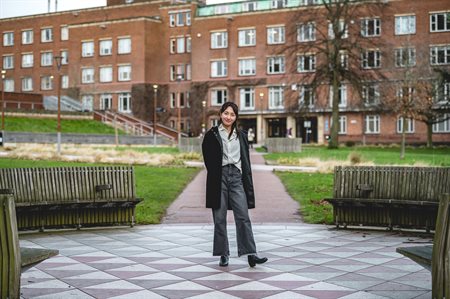UoB 125: Life as a Drama Student Then vs Now
Hey all! I’m Mahina, and I’m one of your Student Content Shapers.

In honour of our university’s 125th birthday, this blog celebrates how UoB has impacted student life over the years and explores some of the generational changes since 1990. I had the pleasure of speaking with Professor Graham Saunders, the Allardyce Nicoll Chair of Theatre Studies and Head of the Department of Drama and Theatre Arts. He graduated from the university in 1994 with a degree in Drama and English, and now leads the same department where he once studied! I was curious to see how his experience compares to mine as a current Drama and Theatre Arts student.
Campus Then vs Now
The university has changed quite a bit since Professor Saunders was a student. For one, the library we now use has been completely renovated. Back in his day, the Drama department was based under the Cadbury Research Library. Staff offices were on the ground floor, while rehearsal rooms and the theatre were located underground.
Now, the Drama campus is based at Selly Oak, and is home to seven rehearsal rooms and George Cadbury Hall. According to Professor Saunders, the Arts Building hasn’t changed much, but one quirky fact he shared was about the lifts in Muirhead Tower: they used to be paternoster lifts, which were old wooden elevators that moved continuously and required you to jump on and off while they were moving. Not surprisingly, they caused a bit of chaos!
Spaces in The Guild like the Dance Studio and Underground didn’t exist back then either. As for accommodation, The Vale only had Tennis Court and Mason halls, and many students lived off-campus in Moseley or Kings Heath as budget-friendly alternatives. Today, most students tend to live in Selly Oak.
Changes in the Curriculum
The Drama curriculum has evolved, but many aspects remain familiar. Students today have more module choices, and the balance of theory and practice (praxis) is still central to the course. One difference? Dance used to be a compulsory module for Drama students, where they studied biomechanics and Laban notation. These classes were held in the Old Gym — now a study and learning space. Personally, I’m not sure I would’ve loved that module as much!
The Production module, which gives final-year students the chance to work on a professional-level production, has stayed the same. Today we have designated seminar and lecture spaces on the Selly Oak Campus, but back then, Professor Saunders said classes were often held in their tutor’s office with just 5–10 students. This close-knit environment helped him discover his passion for historical drama and theory. Originally wanting to become a director or actor, he was grateful for the chance to explore other areas of the field, which he wouldn’t have had access to at Drama School or other universities.
Student Life & Societies
Even back in the ‘90s, Guild Drama was thriving, with two societies: the Guild Musical Theatre Group and the Drama Society. Drama students were always involved in their productions. Fast forward to today, and we now have nine Guild-affiliated drama societies, including Pantomime, and Infinity Stage Company, which I am Press and Publicity for, and more!
Advice from a Graduate-Turned-Professor
From studying the programme as an undergrad to leading the department, Professor Saunders had some great advice for current students:
“Take every opportunity the university offers. Try modules that might not immediately interest you, they might surprise you. Don’t stay in your room focusing only on coursework. Join societies and meet people from other courses too. You’ll never get this part of your life back.”
Thank you to Professor Graham Saunders for his time, and I hope this was a fun way to see how much the University has progressed over the last 21 years!
Help us celebrate our 125th anniversary by sharing your story! Whether it's a cherished memory, a favourite spot, or a moment that makes this University special to you, pitch your idea to studentcommunications@contacts.bham.ac.uk.